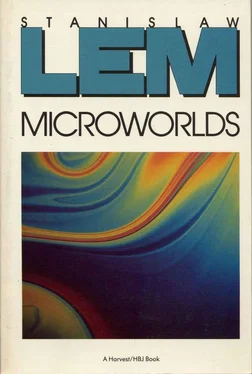The Strugatsky brothers thus demonstrate that they are realists of the fantastic inasmuch as realism in fantasy betokens a respect for logical consequence, an honesty in deducing all conclusions entirely from the assumed premises. Even the uninhibited entertainment industry that encircles the Zone has its plausibility — indeed, I would say its necessity. The principles of human behavior operating in the narrative are thus the same as they ever are; the authors have merely directed their attention to the “dregs” in the cosmic encounters, so to speak — and the events thereby take the concrete form of a miracle introduced into a consumer society. This is not — what is sometimes meant by the latter term — a society that produces nothing but those goods to which consumers are immediately attracted. On the contrary, it is a society that considers everything to be within the scope of its endeavor: not only cars, refrigerators, and perfume but also sex, blood, and destruction it makes items for consumption, in good time seasoning each of them so that they become palatable. In the Middle Ages, the Zones would doubtless have caused movements of panic-stricken flight and migration; and they might afterward have become centers of new religious beliefs, originating in response to their evidence for the Apocalypse, and breeding grounds for prophecies and revelations. In our world, however, the Zones succumb to being domesticated; for what one can neither understand nor ignore, one can at least consume piecemeal. Accordingly, the Zones, rather than being the subject of eschatological thought, are the goal of bus tours. This admits of being explained with reference to a lust for phenomena once regarded solely as abhorrent but these days enforcing the popularity of an aesthetic that in place of beauty has set the repulsive. That is the spirit of the times to which in the Strugatskys’ story anything evincing its complete independence from man — as the mysteriousness of the visitors nearly does — succumbs. All in all, Roadside Picnic implies that the landing passes over ninety-nine percent of humankind without a trace; and precisely in this regard, the Strugatskys set themselves against the entire science-fiction tradition.
Theirs is no banal opposition. Dr. Pilman, given to expressing himself in the terminology of physics, calls mankind a “stationary system” (3:100); translated into the language of the historian, this means that contact with the aliens, insofar as it does not equate with a global catastrophe, cannot change the course of human history with one fell swoop, since mankind is not capable of suddenly leaping out of its history and — impelled by a cosmic intervention — stepping into a completely different history. This supposition — in my view a correct one — is something that science fiction has neglected in its avidity for the sensational. In Roadside Picnic, by contrast, the landing is not intended as something strange for the sake of its strangeness; instead, it establishes the starting conditions for a thought-experiment in the domain of the “experimental philosophy of history” — and that is exactly what determines the value of this book.
There is only one point about which I would fain take issue with the book — a point having to do not with human matters (these are presented unobjectionably), but with the actual nature of the visitors. I might premise my discussion on four propositions. The first is that in the book we are given data, but not necessarily opinions about these data, even when the characters harboring such opinions are holders of the Nobel Prize. This means that we consider ourselves to have as much of a warrant to postulate theories about the visitors as the fictional personages have. Second, on all imaginable levels of knowledge there is given no hundred-percent error-free course of action. Such infallibility would of course require that one possessed complete information about what can occur in the course of making one’s plans a reality; but the universe is a place in which the attaining of complete information about anything whatever is never possible. According to the third of my propositions, the principle of freedom from contradictions in thinking obtains for us as for other beings in the cosmos. This means that of two things, one must prove to be the case: if the “visitors” were aware of the presence of humans on earth, then they cannot at the same time have been unaware of it; if they harbored any design at all vis-à-vis human beings, then they could not at the same time have harbored no design; and so on. Finally, in explaining unknown phenomena, the simplest hypotheses, as stipulated by the principle of Occam’s razor, are always to be preferred. If, for example, we live next door to a famous magician and hear dead silence from his side of the dividing wall for a long while, we can explain that in many ways: the neighbor may have dissolved into thin air, or he may have transformed himself into a paper clip, or he may have gone up to heaven through his window. We would tend to take refuge, however, in the quite commonplace explanation: that he simply left the house quietly and unperceived. Only when that hypothesis proves wrong are we compelled to look for another, and less banal, one.
These are the standpoints from which we negotiate the encounter with the visitors. [19] Our entire explanation, which provides a new interpretation of the riddle presented by the landing in Roadside Picnic, may seem to be an aberration brought on by excessive pedantry, all the more so since, after all, we are not analyzing a real event, but a literary fiction. But truly scientific fantasy is distinguished by just this: that one can subject the events described in it and their rational depiction to the same proof of coherence as phenomena that occur in the extraliterary world. Such a work may start with a fictive, even an extremely fictive, premise. Yet this authorizes only an initial poetic license, which loses its validity within the story itself. This means that the storyteller may not, within the story, continue to help himself along by the ad hoc invention of whatever things or phenomena strike his fancy. Fairy tales may operate with such ad hoc inventions; for they are not at all required to explain logically or empirically the miraculous occurrences they depict. A science-fiction story that makes this fairy-tale license its own leaves the realm of the real world and puts itself in the position of the fairy tale, in which everything that is thought of or said for that very reason instantly becomes possible and must be unquestioningly accepted as true coin by the reader. In short, though the facts in a science-fiction story may be fictive, the way in which science in the fiction interprets these facts may not. Scientific theories change; but what does not change is the method of discovery that characterizes science, and it is precisely this methodology that dictates a certain type of hypothesis-formation in science fiction. Accordingly, our polemic, as an example of how criticism of science fiction should typically proceed, can be applied mutatis mutandis to every work that fulfills the main criteria of this genre.
In regard to the landing, a distinction must be made between what the aliens left in the Zones and the way in which they did this. In the opinion of Dr. Pilman, who expresses the outlook of most specialists, the gap between the civilizations turned out to be too great for human beings alone to be able to surmount it; the other side, however, failed to give its assistance. What the visitors have left behind human beings can deal with only as fragments of a strange technology whose functioning is incomprehensible. As for the manner in which the visitors bequeath the so-called objects to men, Dr. Pilman’s thesis — which is central to the story since the title on the cover already anticipates it — represents this to us in the form of a parable. Mankind finds itself in the situation of animals which, having crept from their hiding places to a roadside or clearing where incomprehensible creatures have stayed, rummage around among the remains of the campsite. This analogy expresses Pilman’s honest conviction, even though in his conversation with Noonan he enumerates other going hypotheses about the landing. Dr. Pilman is not just anyone; he has finally received the Nobel Prize for his discovery of the “Pilman Radiant.” At the same time, he is a misanthrope — as outstanding scholars frequently are. Such men strongly sense the ambiguity of their societal role. For civilized society, which is brought forth from the fruits of their thinking, they are indispensable; yet it treats them quite inconsiderately. The political powers expropriate their discoveries, but public opinion nonetheless makes the researchers themselves answerable for the consequences of that expropriation. An awareness of this situation does not dispose one toward kindliness. Instead it arouses either rebellion or cynicism; but whoever finds rebellion useless and cynicism repugnant tries to behave like a stoic. Such a person gets used to choosing the lesser evil; and when one tries to corner him with questions, he answers evasively or with sarcasm. This is precisely Dr. Pilman’s attitude, a primarily defensive stance which he has assumed in the interview with which the story begins.
Читать дальше












